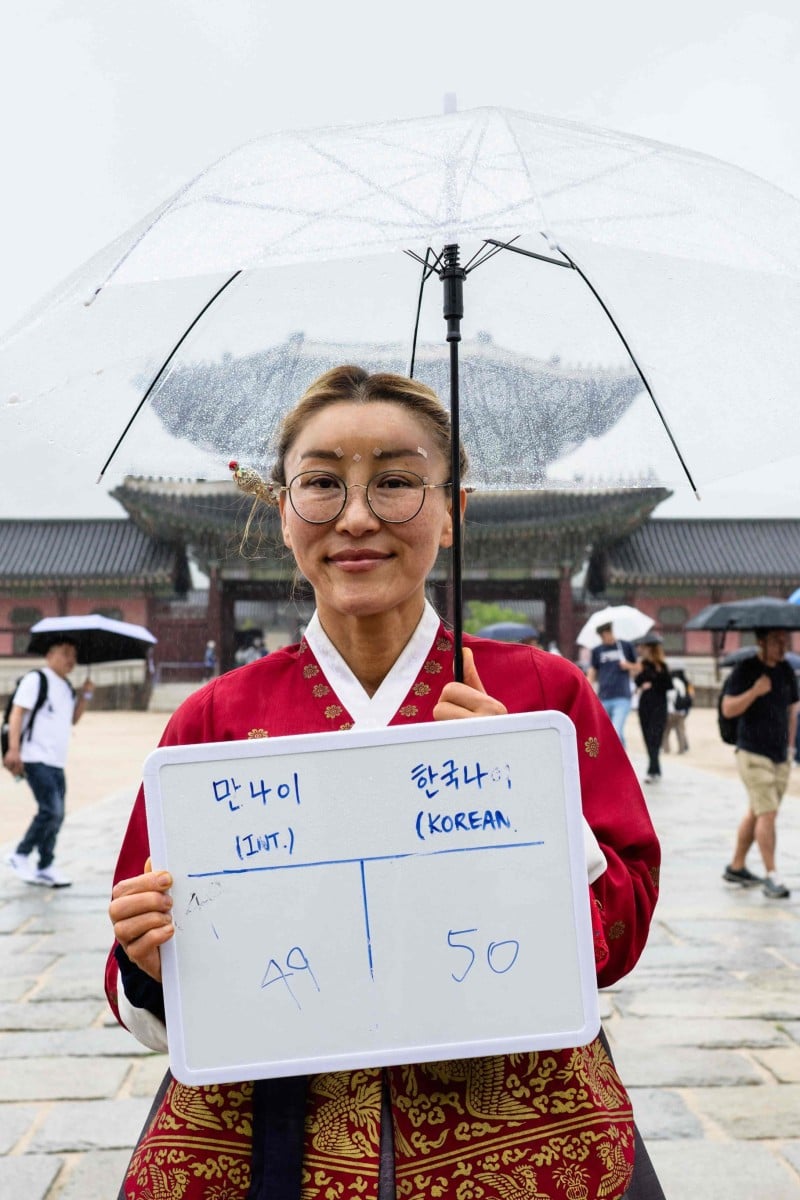
Age is just a smaller number as South Korea drops traditional age system: ‘feel like you’re still young’
- Country was the last in East Asia to officially calculate age by determining babies were one year old at birth because months in the womb counted as first year of life
- South Korea will use international system for age based on date of birth, meaning everyone will officially become a year or two younger
 Kim Min poses with a whiteboard showing her international age, 49, and Korean age, 50. Photo: AFP
Kim Min poses with a whiteboard showing her international age, 49, and Korean age, 50. Photo: AFPLee Jung-hee was set to turn 60 next year. But with South Korea dropping its traditional age counting system Wednesday, the Seoul-based housewife just got a year younger – and she’s thrilled.
South Korea was the last East Asian country that was still officially using a method of calculating age that determined babies were one year old at birth because their months in the womb were counted as their first year of life.
Under that system everyone got a year older with the turn of the year rather than on their actual birthday, meaning a baby born on December 31 would be considered two years old the next day on January 1 in Korean age.
From Wednesday, South Korea is using the international system that calculates age according to a person’s actual date of birth, meaning everyone will officially become a year or two younger.
South Korea cuts ‘killer questions’ from university entrance exam
“It feels good,” Lee shared. “For people like me, who were supposed to turn 60 next year, it makes you feel like you’re still young.”
China, Japan, and even North Korea dropped the system decades ago, but it has endured in South Korea, even as the country has played a larger role on the international stage.
“It’s confusing when a foreigner asks me how old I am as I know they mean international age, so I have to do some calculations,” office worker Hong Suk-min said, adding that he was 45 in international age and 47 under the Korean system.
Why is the government making this change?
The official change will have limited practical impact: many legal and administrative functions already use date-of-birth rather than Korean age. Those using date-of-birth include the age listed on a passport and the age at which one can be prosecuted as a juvenile and receive retirement benefits or healthcare services.
The government hoped the change would ease confusion and cited, for example, the issue of older Koreans who may believe they are eligible for pensions and free travel benefits several years before they legally are.
“There is a difference between the age Koreans use in their daily lives and their legal age and because of that, various legal disputes may arise,” said Seoul’s Minister of Government Legislation Lee Wan-kyu, who is overseeing the official age change.
Your Voice: What Hong Kong can learn from Korean worker’s fight for justice
Lee opened a media briefing on Monday by teaching the assembled journalists how to determine their age: “Subtract your birth year from the current year. If your birthday has passed, that’s how old you are, and if your birthday has not passed, subtract one to get your age.”
The country also has another age system, known as “year age”, which determines key areas including the school year, eligibility for compulsory military service, and the legal drinking age. This system would remain in place for now, Lee said.
Under the “year age” system, for example, everyone born in 2004 – from January to December – is eligible to begin the military enlistment process from January 1, 2023, because they are all legally considered to have met the minimum required age of 19.
The government might consider revising the use of “year age” for such areas depending on how the current changes go, Lee said.
Why is age such a big deal in Korean culture?
According to anthropologist Mo Hyun-joo, “age really matters” in South Korean culture because it affects one’s relative social status and dictates which titles and honorifics one must use for others.
“It’s hard to communicate with people without knowing their age,” she said.
The idea behind “year age” is to make these linguistic-linked hierarchies easier to navigate. This age system ensures that everyone in the same school year is considered the same age, so they can speak to each other without using honorifics.
People typically use terms such as “unni” and “oppa” – meaning older sister and older brother respectively – rather than names in conversation, she said.
Star in your own K-pop video at Seoul’s HiKR studios
South Korea’s “hierarchical age-based culture [might] become neutralised a little” over time, Mo said, as people become more used to using international age in school settings, for example.
For now, most South Koreans, such as eight-year-old Yoon Jae-ha from the southern port town of Busan, can simply enjoy feeling younger as the new legislation comes into effect.
“My age has shrunk,” he said. “I like being younger because then my mum will take care of me longer.”